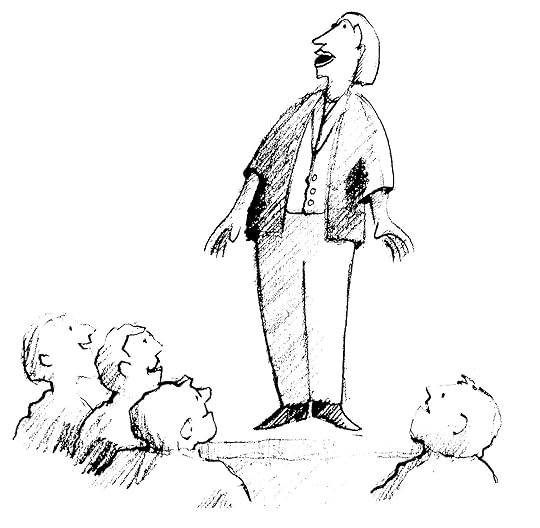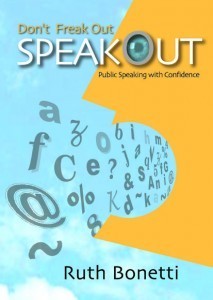Ruth Bonetti's Blog, page 6
November 20, 2013
Tips to ace exams & auditions
Recitals may seem confronting, but the presence of a live audience usually buoys us along. Subconsciously, even consciously, we respond to the interest and empathy from our listeners that may spur us on to play at even higher levels. But what of exams? And auditions for musicians and actors?
One-on-one
An audition or exam is often in a small room, where scribbling of comments seems painfully obvious. In our highly sensitised state, we often assume they’re writing “Mistake in bar 5″ when they may be praising our great projection or fluent finger work!
Or a panel?
Auditions – the equivalent of a job interview – are a trial for both the musicians undergoing them and for the audition panel. Unfortunately, no better method has been found to assess talent, except occasionally a trial period, if a player’s background and reputation warrants. An audition can only artificially duplicate the atmosphere of a concert, as the specialised listeners are there solely to judge rather than to be entertained. But if they can be entertained in the process, so much the better; they are only human after all!
Who hears us?
On the one hand, the performer is keyed up and nervous, hoping to meet the highest standard on the day. On the other hand, the panel usually consists of hardened professionals who have heard it all before and hope that this one will be worth listening to when so many are not!
How to impress
Panellists do want to hear a good performance, one that will make them sit up and listen. They don’t want to be bored and embarrassed by your work. To the extent that you can hold their attention, you’ve got a chance of getting the job! They seek the best talent that they can engage and they are not concerned with your ego or belief that you should be the successful appointee. They will probably not be aware of the standard you are capable of reaching, though if their intuition suggests you could do better, they may ask you to repeat a passage or to try again at a later date.”
Keep trying
For eight months, Bette Midler auditioned for the same Broadway show, Fiddler on the Roof, every time there was a vacancy. Eventually she got a temporary place in the chorus, which gave her the advantage of knowing the production inside out when she auditioned for a star role successfully. From then, the sky was her limit.
Excerpt from Confident Music Performance
With solid preparation, positive attitude and a clear head, you can impress!
October 23, 2013
Ease dry mouth – public speaking
When author Eleanor Catton was named the youngest winner – aged 28 – of the £50,000 Man Booker Prize for her epic novel The Luminaries, she was gobsmacked.
How would you respond?
Although Catton recovered her composure to make a graceful speech, she said she was hit by a “white wall” to hear her name read out. She rose from her table at the black-tie dinner with “dry mouth and trembling knees” according to The Australian newspaper.
Some tips for when you accept YOUR award
Dry mouth is exacerbated by throat tension. To relieve it:
• Drop your jaw and rub the underside of your tongue against the inside of your teeth. This activates the lubricating saliva glands.
• Press the tip of your tongue on the hard palate near the teeth ridge.
• Subtle sucking movements promote saliva.
• Imagine the taste of lemon juice or vinegar.
• Simulate yawns (subtle social yawns, rather than alienate listeners).
A dehydrated performer’s responses become sluggish if fluid is not maintained.
In a “normal” day we need at least eight glasses of water – but increase this for periods of stress. Yes, I know what you’re thinking… you don’t want to haunt the bathroom.
We’re talking HABITS here! Drink plenty of water in those pressured weeks, days, the morning of a presentation. Ease back in the hours and minutes before, perhaps simply taking a sip before walking onto the platform.
(Excerpt from my book Speak Out – Don’t freak out now available as eBook.)
And the shakes? More on this next time.
Short vs. long?
While known and loved writers sell doorstopper size novels, the novice is advised to submit 90,000 words (or better, 80,000). Yet Catton won with a novel ten times that length. Chair of judges, Robert Macfarlane, said “Length never poses a problem if it’s a great novel.” Take heart, authors. Edit, polish, hone your skills and polish, polish.
Speaking short
My writing journey was encouraged to be chosen as one of five authors to pitch their manuscripts before a panel of publishers at Byron Bay Writers Festival. How to condense all that passion and enthusiasm for an absorbing story into FIVE minutes? It was a challenging learning curve, even for an experienced speaker and I’m very grateful for the opportunity. I’ll tell you more next time.
October 16, 2013
Workplace stress: Tips to revive
Last term was longer than usual and many plodded to its end. My husband and I both fell prey to the flu – once we had a lull to rest. At times, our immune system becomes so depleted that it is not surprising if we fall ill. On this ‘Stop the world, I want to get off’ hurdy-gurdy, physical illness may be our only way out.
Let’s ensure that run to end of the year isn’t all downhill.
In a 21st century workplace we’re on the go 24/7. Urgent emails and texts expect a response ASAP or yesterday. We pep up on caffeine, energy drinks, sugar and fast food, living on our adrenalin until that’s worn. With little chance for downtime, adrenal fatigue can catch us out.
I’ve been there, done the fieldwork and learned a few preventative measures myself! At Maryborough Conference when I presented:
Tips to rejuvenate and overcome workplace challenges
Allan Latham said ‘You had me so relaxed I nearly fell off the chair!’
Join this workshop at MTAQ AGM on February 22, 2014. It’s based on a chapter called ‘Me’ Time in my new book, Sounds and Souls: How music teachers change lives, available in hard copy and Amazon Kindle.
Workshop participants learn simple techniques and exercises that can fill a few free moments at the desk between lessons:
Breathe, breathe, breathe! (Don’t we forget when rushing?)
Yoga style breathing and gentler movements like twists.
Stretches: rotate your ankles (relaxes legs) and wrists (helps arm tension). Ease tense muscles with turtle shrugs and neck rolls.
Dr Bach’s Rescue Remedy (available at health stores and many chemists.) Take a few drops when needed.
Herb teas like Rooribos/liquorice root/green, mate or ginseng may help.
Eat regular meals, especially a solid breakfast, or “graze” on healthy snacks every few hours to maintain blood sugar levels.
Consult with your doctor, naturopath or nutritionist in case certain supplements may boost your energy. Women, check iron levels.Unwind in a warm bath with your mix of essential oils, bubbles and Epsom Salt (Magnesium Sulfate).
Schedule some ‘Me’ time each week and enough sleep.
Above all… keep looking up, smile as often as you can.
February 25, 2013
Failure is close to success
We need to see our supposed “failures” in perspective. The fear of success can be as daunting as fear of failure – for then we must live up to higher expectations.
Take Sir Winston Churchill, one of Britain’s most remembered politicians. He was twice Prime Minister, interspersed with years in the wilderness but made a comeback after losing office.
Low beginnings
Churchill was considered something at a dunce at school, dismissed and ignored by his parents. He struggled to conquer a speech impediment, (possibly a stutter, but more likely a lisp) to become a famous orator. Remember that WW2 speech ‘We will fight them on the beaches…’?
If anyone knew failure, surely Churchill did – but was awarded a Nobel prize.
Words of encouragement
Success is the ability to go from one failure to another with no loss of
enthusiasm.
Success is not final, failure is not fatal: it is the courage to continue that counts.
Never, never, never give up.
A pessimist sees the difficulty in every opportunity; an optimist sees the opportunity in every difficulty.
If you’re going through hell, keep going.
And from Thomas Edison
Many of life’s failures are people who did not realize how close they were to success when they gave up.
Do you give up too soon? Keep working! Keep looking up.
Enjoy!
February 18, 2013
Tips for confident music performance
There’s a good chance we will even ENJOY performance if we prepared intelligently and regularly in the months before. We may even manage to shrug off those butterflies and nervous greeblies. The secret is to program our brains for success.
Program your music computer
Think of your practice as computer programming. We feed in correct information about hand positions, the sequence and length of notes. Then, if a wave of panic washes over us early in a performance, it need not dump us. We can surf on automatic for a few moments, knowing that our brain will send messages to our fingers or lips without our consciously driving them. How’s that for a confidence trick! (From Practice is a Dirty Word)
Record and listen back
What passages, bars, sections need most attention? With a photocopy of the part (you do own it, yes?) highlight any mistakes and fumbles. Count the number of highlight splats – and apply most of your practice to these bars. A week later record again and listen back with a fresh photocopy. Have your splats reduced?
Go for goals
Set yourself achievable, reasonable, short-term aims each day. Within each time slot, allow yourself several minutes’ relaxation, movement, a breath of fresh air, and a drink of water. Oxygen and water are powerful brain foods. You will then use work-time more efficiently and minimise risk of repetitive strain injury.
Give yourself the satisfaction of crossing goals off the list when they are reached. Reward yourself with a pat on the back or a treat.
Practise what you can’t play…
…Instead of what you can! There’s no time to waste in reassuring yourself by playing the easy bits that lie under your fingers. Tackle the cross-rhythms or that development section that bristles with double sharps in obscure keys.
Make every minute of your practice time count.
Keep at it! You can achieve wonders with focus and determination.
February 11, 2013
Do SHAKES rattle your presentation?
Many performers, whether they present through words or music, have been disconcerted by jitters at some stage. String players dread wobbly bow strokes; vocalists that unintended vocal vibrato. Shaky hands or lips inhibit many instrumentalists. Pity the trumpeters, whose fingers are all too obvious right under their noses! At least public speakers can hide their hands in pockets (NOT a good look, however) or grip the lectern (only minimally better).
It’s all part of the fight/flight adrenalin rush
We cannot rabbit off stage. Avoidance is counter-productive. Authors may be solitary types, happiest with a pen and paper or a keyboard, but they must face audiences and media on the promo tours.
We need tactics to counter jitters.
SHAKES seem obvious to the performer – small comfort that most listeners are oblivious.
Our society tends to silence problems with pills rather than find a solution.
“Beta-blocker” drugs block the adrenalin reaction and anxiety symptoms by slowing the heart rate to reduce sweating and tremors: they do not stop nerves, but lessen symptoms. Medical prescription is essential as they can be dangerous for people prone to diabetes, certain heart conditions, bronchitis, depression, hay fever and asthma.
Test suitability well before a performance – rather than discover an unsuspected cardiac or asthma condition onstage. Reported side effects include dizziness, light-headedness, nightmares, hallucinations, lethargy, insomnia, visual disturbances, diarrhoea, drowsiness, cold hands and feet.
Surely there are practical, doable and non threatening solutions? Well, I’m glad you asked…
Channel Adrenaline
Diffuse excess adrenaline with Brain Gym’s “Positive Points” technique. Place a hand on your forehead, inhaling deeply. This simple action encourages blood flow to the frontal lobes where rational thought occurs. It curbs fight or flight jitters, releases memory blocks and enables you to walk onto the platform accessing your whole brain. If memory slips intrude mid-performance, simply pause between movements, breathe deeply with a hand to your forehead and regain focus. Also, holding these emotional stress-release neurovascular balance points of the stomach meridian curbs stomach queasiness.
Try the contrary approach
The more we try to control shaking, the worse it gets. Instead, try the paradoxical approach. Rather than fight against shaking, allow yourself to do so. Give yourself permission to shake. “So, you want to shake, fingers. Well, go on – shake.” Some performers consciously make their hands tremble, their knees shake or their palms sweat as a way of trying to produce the symptom rather than conceal it.
Wiggle your toes
Focus your attention elsewhere. On your toes, as did John, a talented organist and clarinetist I coached in an American summer music program. He admitted to suffering every symptom possible when performing. Soon after his session, he performed creditably. I congratulated him on his poise and calm; if he experienced any jitters they were not obvious. “Oh,” he said, “my hands shook in the beginning, then I remembered what you said and focused on my toes. When they started to shake I brought my attention back onto my hands, and by then the piece was over.”
Work those fingers
Jittery fingers may be a product of tense muscles or of too much energy as a result of the adrenaline rush. Before going on-stage, shake or rub your hands together. Squeeze your fingers into a tight fist, then release.
Move thoughts elsewhere
Another solution is to direct thoughts onto another aspect of your performance. Our minds just cannot think of two things at once.
Choose to focus not on your weaknesses, but on your strengths.
December 4, 2012
Handle questions with poise
It’s the fear of the unknown, right? Speakers may flinch at the thought of answering Q & A – especially if they’ve seen experienced presenters handle this aspect with loss of poise. You will not have this worry if your speech preparation included noting potential queries and practice of appropriate answers. Here are some more tips from my book Don’t Freak Out – Speak Out.
“Are there any questions?”
These words often are met with bald silence. This does not imply failure. If your presentation was so concise and clear that no clarification is needed, or the audience needs a break after a long presentation, don’t extract unwilling questions. Many people may be shy of speaking out and prodding is counterproductive.
Ice breakers

Perhaps you might plant a colleague in the audience, primed with a preferred question which you can answer with ease. This breaks that uneasy ice and triggers other questions.
You could clear the fog with: “Often I’m asked …”
Listeners use a different part of the brain when absorbing content, so they may be not yet ready to verbalise.
A less threatening prompt is to ask them to “Turn to the person next to you and discuss …” Or you might casually say, “While I drink a glass of water, think if you have any questions to ask me.” That water will also help you to think fast if any curly questions are lobbed from left field! In which case, pause. Reflect. (Perhaps during that moment, ask if a member of the audience may answer the question for you.)
Repeat the question
… not only for the people at the back of the hall – who will appreciate your consideration – but also for the tape if you have agreed to a recording. Rephrase and simplify any convoluted or stumbling questions.
Remember, you’re the expert
You were invited to speak because of acknowledged qualification or experience. You are prepared, up to date on the research. Most of the audience could not match your command of the topic. Although some questions may be tricky, delivered from grandstands or pushed in wheelbarrows, it is rare that they are actually as hostile as they might first seem. An “on-edge” presenter may mis-read an enthusiastic question as an effort to trip him or her.
Compliment useful or stimulating queries to reinforce important points from your presentation: “That’s an excellent question, I’m glad you raised it.” (But don’t enthuse over all questions or you may appear fawning.) Phrases like “As you no doubt know …” “Perhaps you might briefly share your expertise with us …” defer to their knowledge while giving yourself time to marshal your own thoughts.
The floor is yours.
You own the space.
You are the expert.
If you can’t answer
• It’s better to admit it openly than to tangle yourself up in convoluted attempts.
• People appreciate the honesty of “I don’t think I could do justice to that complicated question without further time or research, but I would be happy to follow it up with you later.” Or “I’m not prepared to answer that at present; would someone else like to enlarge on it?”
Perhaps you might feel challenged of neglecting certain sources or accused of omitting important points. Check that you understand each other before hackles rise. They may be working on similar research. Look for areas on which you can agree.
Counter hostile questions
• Drop your shoulders, take a deep breath and a drink of water.
• Listen carefully, look to agree on some common ground.
• Empathy helps to defuse possible aggression and maintains rapport with the rest of the audience.
• Remain objective and realise the person may be envious of your position on the podium. Understanding their position enables you to respond with compassion.
• Maintain a neutral, even voice and avoid emotive language. Look on this as an excellent opportunity to re-state your position: “Let me clarify my point.” Find a source of agreement: “I understand that you do agree with me on …” Or cut it short with “I value your question but I don’t think it’s applicable to today’s topic. I’m happy to discuss it further if you come and see me later.”
Deal with their point briefly and then call for the next question. Dodge inelegant public power-struggles which will alienate the rest of the audience, who are otherwise on your side.
Most grandstanders will desist once they have their quota of attention. If they try to turn it into a debate, suggest following up the discussion at the end of the session rather than take time from others’ questions.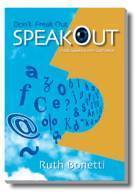
Don’t…
• Attack those who ask questions, accuse them or call them names
• Dodge answering – it looks shifty
• Fudge answers; audiences can see through this
Keep an eye on the time so your audience does not become restive. Give a brief wrap-up, restate your conclusion and thank them for their interest.
Be prepared, concise and clear. Don’t freak out; speak out!
Ruth’s book is available at http://www.ruthbonetti.com/books.html
October 24, 2012
Tips to shine in the spotlight
THE SPEAKER:
That sea of faces in an auditorium, or colleagues around a board-room table, or even a confronting one-on-one situation – all can be stressful.
THE AUTHOR
…fronts a mic on the PR trail to read their work at a festival or launch.
THE MUSICIAN FACES AN AUDITION, FIRST NIGHT OR EXAM.
When examining,the first thing I do to put nervous players at ease is offer them a glass of water. As well as giving them time to relax and regroup, it makes a surprising difference to accuracy and poise!
Under the spotlight, our systems, multiple signals buzz from brain to body. And the electrical and chemical actions of the brain and the central nervous system are conducted by fluid.
Our bodies are made up of about 70 percent water; this is an excellent conductor of electrical energy, necessary to efficiently pass messages between the central nervous system, brain and sensory organs.
In a “normal” day we need at least eight glasses of water – but this should be increased to see us through periods of stress.
A dehydrated performer’s responses become sluggish if fluid is not maintained.
DURING CHALLENGING TIMES, INCREASED WATER INTAKE IMPROVES:
• concentration
• mental and physical co-ordination
• it alleviates mental fatigue
• increases energy levels
• relaxes for improved communication
• it keeps our brain firing.
Yes, I know what you’re thinking!
The down-side is frequent visits to the bathroom – another nuisance symptom of performance nerves. Many notice that nerves increase their frequency of urination. Why? The smooth muscle of the genito-urinary system contracts when our sympathetic system is activated. Increased adrenaline rush and resulting cardiac racing can cause diuresis. Such issues are eased if we learn to channel that adrenaline away from such symptoms into energy.
WE’RE TALKING HABITS HERE – THE WEEKS AND DAYS BEFORE PERFORMING
Drink plenty of water earlier in the day, then limit the fluid intake in the hour before performing to avoid the need to go to the bathroom. If necessary, relieve mouth dryness with rinses or gargling.
from Confident Music Performance
Visit http://ruthbonetti.musicabonetti.com/ for the full post
October 23, 2012
Tips to shine in the spotlight
THE SPEAKER:
That sea of faces in an auditorium, or colleagues around a board-room table, or even a confronting one-on-one situation – all can be stressful.
The AUTHOR
…fronts a mic on the PR trail to read their work at a festival or launch.
The MUSICIAN faces an audition, first night or exam.
When examining,the first thing I do to put nervous players at ease is offer them a glass of water. As well as giving them time to relax and regroup, it makes a surprising difference to accuracy and poise!
Under the spotlight, our systems, multiple signals buzz from brain to body. And the electrical and chemical actions of the brain and the central nervous system are conducted by fluid.
Our bodies are made up of about 70 percent water; this is an excellent conductor of electrical energy, necessary to efficiently pass messages between the central nervous system, brain and sensory organs.
In a “normal” day we need at least eight glasses of water – but this should be increased to see us through periods of stress.
A dehydrated performer’s responses become sluggish if fluid is not maintained.
During challenging times, increased water intake improves:
• concentration
• mental and physical co-ordination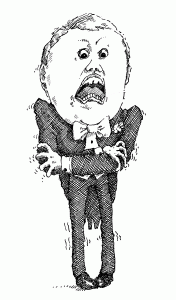
• it alleviates mental fatigue
• increases energy levels
• relaxes for improved communication
• it keeps our brain firing.
Yes, I know what you’re thinking!
The down-side is frequent visits to the bathroom – another nuisance symptom of performance nerves. Many notice that nerves increase their frequency of urination. Why? The smooth muscle of the genito-urinary system contracts when our sympathetic system is activated. Increased adrenaline rush and resulting cardiac racing can cause diuresis. Such issues are eased if we learn to channel that adrenaline away from such symptoms into energy.
We’re talking HABITS here – the weeks and days before performing
Drink plenty of water earlier in the day, then limit the fluid intake in the hour before performing to avoid the need to go to the bathroom. If necessary, relieve mouth dryness with rinses or gargling.
from Confident Music Performance
Singers and speakers need to maintain hydration of the vocal folds.
Don’t Freak Out – Speak Out advises:
• Increase water intake. Adopt the singer’s maxim, “pee pale, speak clear”.
• Rehydrate the vocal folds with steam inhalations and a humidifier.
• Humidify your bedroom or work environment, especially during winter.
On-stage, I like to have a water bottle discreetly at hand for a sip between music pieces or movements. This eases another problem that besets performers; dry mouth.
“Water is the only drink for a wise man.” Henry David Thoreau (1817 – 1862)
OK, after all your preparation you deserve to unwind with a drink – after the performance.
Cheers!
September 17, 2012
You only get one chance…
AS A READER – do you judge a book by its cover?
In a book shop a cover or title sparks our eye. We skim-read the back cover, then open at the first page, taste a few pars. This is usually enough to decide if we want to spend time with that author and that story. We lead busy lives and throw aside a boring book.
In my writing, of books, articles and speeches, I seek a tantalising hook.
As a musician, I focus on a wonderful entry of sound.
FOR WRITERS: How to hook publishers and readers
Authors hear horror stories that a publisher may read a precious manuscript for one page – at best – before rejecting it. Make that a paragraph, even the first sentence. Poetic flights of imagination in chapter two are lost if people don’t read that far.
We sweat over our opening phrase, for it has to catch the reader’s eye, prick interest.
My past decade has been absorbed writing a narrative nonfiction around family stories which morphed into memoir. I’ve changed the starting point many times; different chapters took their turn to usher potential readers into my story. My writing buddy switched on a light-bulb when she suggested ‘Play your strongest card first.’ I wrote a new chapter, praying for a ‘killer opening sentence.’ But before submitting to an editor, I still polish these pages, the voice, the tone – to ensure it will be read!
FOR MUSICIANS:
My music student is delighted with her recent exam results – perhaps because her lesson before was one of those frustrating ones. You know the type? The teacher spends half the lesson on the first line of the first movement. ‘What about the modern work, the rhythms and ensembles are so tricky!’ I hear her think. True. But I know that if she can catch the examiner’s ears, start strongly, she will ride through further difficulties on a wave of confidence. For didn’t we spend the past months smoothing out such issues?
AS A PERFORMER: (picking up my clarinet)

Carl Maria von Weber wrote some of the clarinet’s most satisfying repertoire. His second clarinet concerto asks the soloist to make a loud dramatic opening on a top note. In this case, I attack it with the fingering that speaks easy and safe, with no risk of squawk.
Yet Weber asks me to creep in on a subtle pianissimo in his other two works for solo clarinet. To avoid an undertone on this most vulnerable, touchy note, I need just the right angle of instrument and just the right reed. Before a recent performance my practice alternated a dozen reeds, narrowing down to a few in the pre-concert rehearsal in the venue. Obsessive? Possibly. But it pays off, because I know if the first note sings out beautifully, the rest of the performance will flow with ease. I can relax and enjoy the music.
IN COMPETITIONS:
As an adjudicator I see and hear the value of a positive first impression. As I wrote in my book Confident Music Performance:
A positive opening is crucial The first notes or words are very important for your own confidence and the audience’s appraisal of you. If your initial sound is squeezed out with strangled tension or a miscalculated projection, your stomach will plummet. You will think, ‘Oh no, this is going to be a fiasco!’
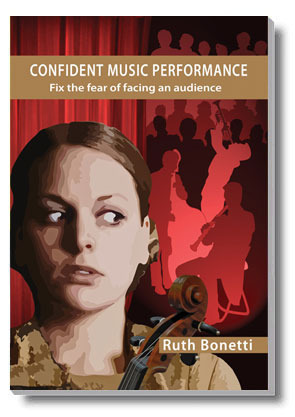 If that first note or word sings out beautifully modulated with seemingly effortless ease, your confidence will soar with it. First impressions linger in listeners’ appraisals. In most auditions, a few seconds are enough to tell the
panel if they are interested in the applicant. When I adjudicate, I notice constantly that a player’s control of their first note or lack of it is usually indicative of their whole performance. On the other hand, if you suffer an initial mishap, don’t give up. Many players warm into their presentations.
If that first note or word sings out beautifully modulated with seemingly effortless ease, your confidence will soar with it. First impressions linger in listeners’ appraisals. In most auditions, a few seconds are enough to tell the
panel if they are interested in the applicant. When I adjudicate, I notice constantly that a player’s control of their first note or lack of it is usually indicative of their whole performance. On the other hand, if you suffer an initial mishap, don’t give up. Many players warm into their presentations.
FOR SPEAKERS:
When I coach people with their presentation, we may spend two-thirds of the time working on their opening sentence. We reword it for arresting impact and to avoid words that may stutter. We identify crucial words to colour with voice tone; to highlight with a pause and breath. We practise delivery and projection to increase impact.
From Don’t Freak Out – Speak Out: Public speaking with confidence
The public speaker must capture the audience in that first tantalising sentence. Many listeners give undivided attention only at the beginning and end of a speech. Choose your opening gambit with care, condensing into it your most arresting statement or an intriguing question, a quotation or startling fact, or a story. People of all ages love stories, but they must be relevant.
If your take-off is smooth the rest of the flight usually flows with fewer bumps. Navigate your course with a clear focus on the horizon – your audience – rather than dwell inward on your own queasy stomach and sensitive ego. Most fears are self-centred. Keep looking out! Most listeners will empathise with your agonies but would prefer not to suffer along with you. They are there to enjoy themselves, to be enlightened, provoked or touched by your content. Rather than wish you ill, they want you to succeed. Adopt a friendly face from the audience and pretend she is your grandmother in whose eyes you can do no wrong. Speak to her.
IN THE BEGINNING…
Whether we present words or music, read or spoken, never underestimate the power of a positive opening. Our listeners and readers respond to those first moments; if they are arresting, powerful, beautiful, we hold our audience in the palm of our hand.
Enjoy!

